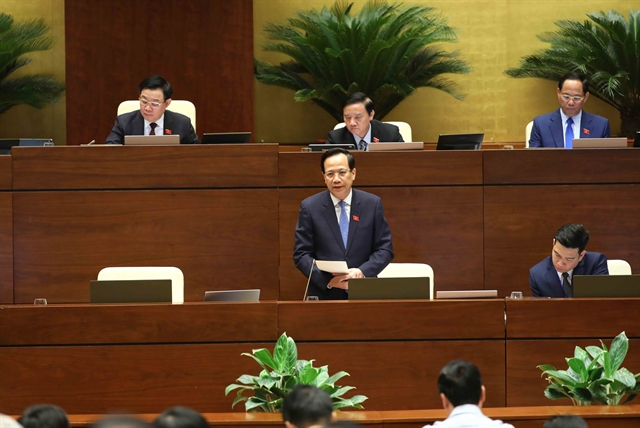 Politics & Law
Politics & Law


|
| Minister of Labour, Invalids and Social Affairs Đào Ngọc Dung answers questions from NA deputies on Tuesday. — VNA/VNS Photo |
HÀ NỘI — Việt Nam’s labour productivity and labour predictions in the context of economic challenges were among the hottest issues as Minister of Labour, Invalids and Social Affairs Đào Ngọc Dung was the first one to take on questions from National Assembly (NA) deputies on Tuesday.
According to the minister, as of May 26, 506,000 workers nationwide either lost jobs or had working hours reduced due to a fall in orders and many other factors. Among those, 270,000 workers were unemployed.
The unemployment rate in the first quarter of this year stood at 2.25 per cent, Dung added, saying: “Việt Nam experienced shortages of jobs, but our unemployment rate still stands low compared to the world.”
Deputy Nguyễn Thị Việt Nga from Quảng Bình Province’s delegation, said: “In 2023, our country's economy has faced many challenges, the labour market faces many risks, and job loss takes place on a global scale. The report of the Ministry of Labour, Invalids and Social Affairs shows that the unemployment rate in our country is low. Does it really reflect the fact?” she said, asking for labour predictions in the future.
Dung said the unemployment rate of 2.25 per cent is based on objective and scientific assessments set by international standards.
Responding to questions over labour predictions, Dung said the projections must be based on socio-economic development forecasts.
In the future, business and production are predicted to continue to experience more challenges, especially in labour-intensive sectors, such as leather footwear and textiles, he said.
“The unemployment rate is likely to increase but not much,” he said, adding that the current unemployment rate is controllable.
“In 2021, we were worried that our supply chain would be disrupted due to a large number of workers leaving cities for hometowns during the pandemic. But we did not let that happen.
“Now we are not negligent but should not be pessimistic. Businesses and investors will take various measures to retain workers and stabilise their lives,” he said.
Deputy Nguyễn Thị Hà from Bắc Ninh Province’s delegation, said the labour force quality of Việt Nam is low compared to many other regional countries, citing the statistics that only 26 per cent of the Vietnamese labour force have degrees and certificates.
In response, minister Dung admitted that the rate of skilled workers in Việt Nam is low.
More than 70 per cent of labourers have been trained in different forms, but only 26.4 per cent have acquired degrees and certificates, according to statistics updated in the first quarter.
Dung said Việt Nam lacks a high-quality labour force. The labour structure is not balanced with a lower proportion of skilled workers.
The most important factors are professional skills, professional competence and work efficiency of employees, he said, noting that there should be assessment tools and criteria to determine labour quality as well as standards on the recognition of certificates and diplomas.
Vocational training
Huỳnh Thị Ánh Sương, deputy from Quảng Ngãi Province, proposed solutions to encourage vocational training to make it a part of universal education and a student’s priority, not the last option in case there was no other choice when students didn't pass high school exams.
Dung said there had been policies encouraging students in ethnic minority areas to attend free vocational training courses. Graduates will be connected with businesses for job opportunities. Thanks to those policies, 85 per cent of vocational training graduates have jobs.
He said there is a common fact that many vocational schools are training the same majors in one location, leading to excess supply over demand.
He noted that vocational training must be relevant to practical demand. Training is approved only when there is a demand.
Deputy Nguyễn Thị Việt Nga from Hải Dương Province raised an issue over an increasing number of Vietnamese labourers being scammed when working overseas.
Minister Dung said most scams were reported at illegal job centres. In 2022, 62 unlicensed businesses were punished.
Lump-sum social security claims on the rise
Many NA deputies raised questions over an increasing trend of claiming lump-sum social security payments, mostly among low-income factory workers after the COVID-19 pandemic.
Minister Dung cited that before 2019, the number of lump-sum social security payment claims was 500,000 per year on average. In 2022, the number climbed to over 900,000.
“The number of lump-sum social security payment claims equals the number of new social security beneficiaries,” he said, raising a worry that if this trend does not slow down, retired people will face lots of difficulties, and Việt Nam will not be able to ensure the sustainability of the social welfare system.
He said the social security law should be amended to expand the rights of social security beneficiaries, adding that the proposal of setting up a fund supporting labourers who claim lump-sum social security payment will be carefully studied. —VNS




